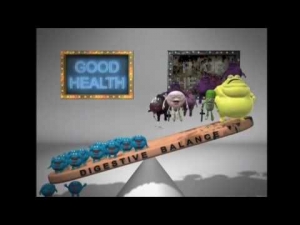Irritable Bowel Syndrome is the name given to a bunch of uncomfortable gut symptoms such as bloating, distention, wind, pain, constipation, diarrheoa, indigestion and fatigue. When tests comes back negative it can feel like its the diagnosis you get when they can’t figure out what wrong with you!
Some people experience symptoms from the the minute they wake up, to others who find that gas builds during the day, and by late afternoon you look and feel like you are 6 months pregnant!
IBS is very frustrating, because the cause is not well understood, there is medical cure, and while it can be incredibly uncomfortable, it’s not considered a real, so you don’t get a lot of answers or much support.
What’s going on!
Underlying every case of IBS is gut dysbiosis, that’s when your gut flora is out of balance. Can you picture the ad with the seesaw, with the good guys – the probiotics on one side and the bad guys, like anti-biotics, alcohol and junk food on the other? 
So dysbiosis is the underlying problem, and it is usually stress, food intolerance or both which sets it off (trigger).
Many of us underestimate how much stress we are under. Homeostasis is the state of maintaining a stable internal environment within the body. Stress is defined as anything that upsets homeostasis, so inflammation, poor sleep, too much alcohol, poor blood sugar control from skipping meals, or any perceived injustice in our lives, raises a survival alarm in your brain, and a stress response from your hormones and nervous system.
Food intolerance can often be hard to figure out, as unlike a food allergy the reaction is usually delayed, or you have to consume a certain amount over hours or days before you breach your tolerance threshold. It’s usually not a particular food that you are intolerant to either, it’s usually a protein or chemical, and that can be common to a number of different foods. Food tolerance can change due to age, stress or illness, so what was ok last year, or even last month, can suddenly give you trouble. With a little bit of guidance though you can figure it out.
Here are my top 10 tips for IBS (plus a bonus)
- Have a holiday from dairy – Dairy is considered one of the most inflammatory foods, and the lactose in dairy, is particularly difficult to digest. Undigested food goes on to feed the bacteria in the bowel, which make gas as part of their metabolism. It is gas that makes you feel bloated and that causes pain. When it comes to food intolerance brought on from stress or illness, dairy is usually the first food people have problems digesting, even if t is normally ok.
Tip: A drop of milk in tea or coffee once or twice per day is usually ok, but milk on cereal, cappuccino, yogurt, ice-cream or custard are not. Cheese is ok for some people, but not others, so if you are unsure take a break and see whether it feels better.
2. Reduce sugar consumption by removing added sugar from your diet, which means avoiding or reducing processed and packaged foods which taste sweet. Sugar is the favourite food of the bad bacteria in the bowel which make the gas and toxins causing the problems.
3. Fructose is the natural sugar in fruit. With IBS often comes fructose malabsorption. The fruits that contain equal parts fructose and glucose are usually ok. So if you don’t want to give up fruit, stick to the ones that are generally safe like berries (except blackberries and cherries), bananas, kiwi fruit, and melon (except watermelon). Note that apples and pears are out. Maple syrup is ok, honey is not. (full list available)
Tip: Watch what you drink. Drinks like soft drink, cordial, flavoured milk (see above) and even fruit juice are high in sugar.
4. Avoid onion, garlic and wheat. These foods contain Fructans (not to be confused with fructose); carbohydrates which are hard to breakdown and digest. Gut dysfunction means that inflammation will inhibit the proper digestion of these carbohydrates which end up fermenting in the large bowel. When you think of fermentation you think of bubbles of gas, not what you want in your tummy.
5.void legumes and soy. Beans have a reputation for being gassy for a reason. That’s because they too are hard to digest, and also ferment in the gut.
6. A less obvious food that you might not suspect for a million years are nuts!. They are high in phytates which make them hard to breakdown. This is an evolutionary mechanism so that they remain whole in the digestive system of animals and birds to get excreted out and returned to the earth where they can grow into a new tree. Pistaccios and cashews are the worst, followed by almonds and hazelnuts. Walnuts and peanuts are generally ok.
7. Does cabbage make you windy? There are certain otherwise healthy vegetables that can also contain fermentable fibre, for example asparagus, cauliflower, beetroot, avocado and even sweet potato! (full list available) It’s unusual for these foods to cause long-term problems, but to give the gut a rest and chance to recover, short-term removal helps.
8. Artificial sweeteners, diet drinks and diet foods contain various sugar alcohols which can directly irritate the gut lining, and which also ferment. Give-away the sugar free gum, or diet coke for a trial period and your gut will thank you!
9.Try ginger tea, slippery elm powder or aloe vera juice to soothe the inflamed lining of the gut. If it feels like your gut is in spasm or cramping, Mintec, a product from the chemist can help. It contains peppermint oil inside an enteric capsule which you need to swallow whole. Turmeric and ginger are excellent anti-inflammatory spices, so add these foods every day, or as often as you can.
10. Eat cooked foods rather than raw. Cooking starts the process of breaking down food, so it is easier on your digestion. The body also doesn’t have to work as hard to warm the food up once it is inside you, and that energy can be put to better use digesting and absorbing the nutrients.
11. If you’ve ever has butterflies in your tummy before a confrontation or important event, then you know how stress can upset your tummy. Stress causes an immediate response from your nervous system to direct energy away from your trunk to the periphery. This is so the muscles in your limbs are ready to fight or flee, and your brain is getting maximum oxygen and energy to be able to think and react quickly and pull you out of danger. In the process functions like digestion and elimination get temporarily shut down.This is fine, unless you are under stress all the time, because then your gut slows down all the time.
Tip: We can not change the stresses that are foisted on us by others, but we can take steps to better regulate out internal environment, our homeostasis. Do you often have a mid-afternoon slump, when you need sugar or caffeine to get you going again, or do you find it hard to get out of bed most days, then you have a blood unstable blood sugar. The brain likes a nice steady even flow of blood sugar, and when this doesn’t happen, alarm bells ring, an unseen stress response takes place in your body, and digestion gets disrupted..
12. Quality sleep is really important. You might wonder what sleep has got to do with your gut. Broken sleep, not enough sleep or restless sleep for as little as four nights in a row is enough to dysregulate cortisol the main stress response hormone. Elevated cortisol can cause inflammation, as well as blood sugar instability, and robs you of energy – three things that can and do affect you digestion.
Last tip and my favourite – Take a good quality probiotic with as many different strains of good bacteria as possible for at least one month. (Diversity is the key when it comes to gut flora balance). The best probiotics will have 10 or more strains, and need to be refridgerated. Take your probiotic first thing in the morning and last thing at night for best results. Regular high quality probiotic use will help sort out constipation and motility problems.
A low FODMAP diet can bring relief from the symptoms of IBS within days. Certain herbs can sooth, and specific nutrients can cool un-seen inflammatin and go to work repairing the damaged gut wall. It’s not complicated, but to do it properly can take anywhere from 3 weeks to a couple of months, depending on the severity.
There’s still loads of foods you can eat, and the goal is to identify the problem foods (sometimes they are not what you think), so that you can have the rest, and then hopefully after a few months even the problem foods are once again available to you.
If these tips and a low FODMAP diet do not satisfactorily resolve your gut issues, perhaps something else is going on. Candida overgrowth can cause the same symptoms as IBS, so too can parasites, read about it here, or even histamine intolerance.
If you are sick of IBS, don’t put up with it. There is another way!






I totally agree that we can’t always change the stresses that we have, but we can try to regulate ourselves better to deal with it. I often get ill when there is too much stress on me and it makes for a miserable time. I’ll have to try some of the tips on your list here and see if they help my stomach handle the rigors of life a little bit better. Thanks for the tips!